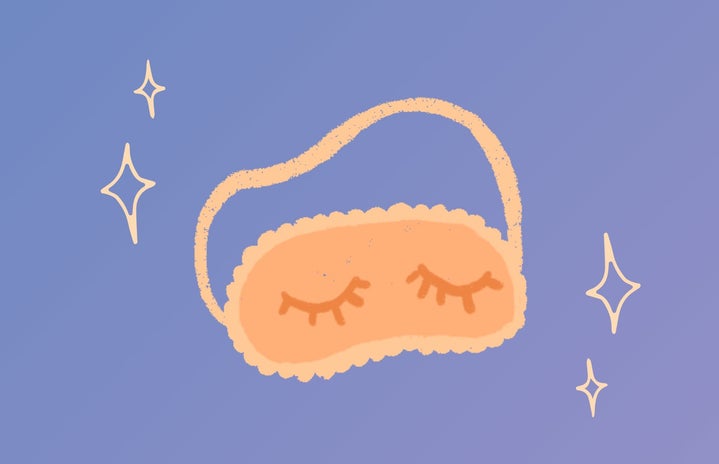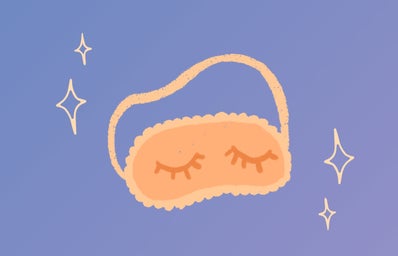World Sleep Day is hands-down my new favorite holiday – on March 19, I can celebrate the hours I’m not even doing anything! Taking time to slow down and appreciate the hours in-between our hectic lives is a rare treat, so I’ll be snoozing to my fullest. In preparation for World Sleep Day, I’ve been experimenting with different sleep schedules, habits and substances to enrich my resting state. From keeping a dream journal to axing my morning alarms, I’m curious on how my waking actions can impact my mystical sleep world.
The brain deserves uninterrupted, peaceful time to recuperate and form important neural connections. As a newly-minted adult, I’ve realized that glorifying sleep deprivation and “burning the candle at both ends” isn’t a sustainable way to live, and my friends and I now revere sleep, and prioritize it like it’s something sacred. Over the last month, I’ve discovered it’s simple and fun to experiment with personal sleeping habits that can improve sleep quality, fuel creativity and decrease anxiety (I’m looking at you, iPhone alarms). I played around with the seven methods below to enhance my REM sleep and wake up feeling truly pizzazzed, no caffeine pills or frothy cappuccino needed.
- Stagger alarms in the morning
-
I’ve been an alarm fiend since early high school. My phone would buzz wildly at 5:10am while I stumbled to the freshly toasted Pop-Tart my mom prepared. My college days were also defined by these alarms, and I would even “test” them out the night before so I didn’t mistakenly miss a 7am Accounting Regulation class. I didn’t want to bring this unhealthy relationship with alarms into adulthood, so I talked with friends about the best ways to wake up naturally (but still on time). I received the gambit of answers: wearing an Apple Watch to sleep so it softly buzzes on my wrist, natural sunlight lamps and essential oil speakers all came into play.
However, I tried another method that was easier and cheaper; I let my body decide when it wanted to wake up within set constraints. I usually set my alarm for 7am, but I’m constantly waking up in the middle of dreams and feel disoriented. I began setting my alarms for 8am with the intention of waking up earlier if my body chose to. Just by shifting my mindset to a more relaxed one, I wake up closer to 6:45am, and feel way more rested than when my alarm blared at 7am. This way, my anxiety about missing an alarm is near zero, and my mind gets to peacefully reemerge from a REM cycle.
- Keep a dream journal and stick to it
-
Dreams are a playground and therapy session for your mind. There’s oodles of research about the purpose of dreams (memory processing, consolidation of knowledge, unconscious self therapy, etc.), but rarely did I remember them the morning after. That all changed when I started writing in a dream journal for 10 to 15 minutes after I woke up. At first, my entries were a mashup of one-word sentences and “I can’t recall, but I think this happened…”
After two weeks, dream recall came naturally, and I was almost primed to remember them upon waking. Not only do I feel less stressed since I have a set routine (i.e. wake up at 7am, journal for 15 minutes, yoga, coffee, etc.), but I also notice patterns in my dreaming world that mirror my physical reality. My dreams usually involve bodies of water, friends and family, recent travel destinations and my aspirations. I feel creative and refueled in the morning thanks to my journaling, and I look forward to sleeping at night. Dream journals can also prep you for lucid dreaming and processing intense emotional experiences.
- Limit alcohol consumption right before bed
-
I’ll admit, red wine sometimes gets the best of me when it’s 11pm and I can’t fall asleep. Throughout college, I was always under the assumption that alcohol helps you sleep better – it’s a depressant after all, right? I didn’t pay attention to my waking up multiple times during the night, extreme dry mouth and partner’s complaints that I snored after I drank. After reading the research, it’s pretty clear that alcohol and deep sleep do not mix (much like tequila and peppermint tea); even though alcohol is a depressant, it suppresses your REM sleep cycles and leads to more frequent disruptions. For a quick refresher on sleep cycles and where the REM state slides in, I recommend watching this trusty Crash Course video with Hank Green.
I limited my alcohol consumption for nearly 3 weeks straight (no Tuesday night lagers), and the effect was immediately apparent. Not only was I ditching hangovers and having uber productive weekends, my sleep quality was also impeccable. No tossing and turning, no accidentally waking up my boyfriend with my caveman snores. I’m not swearing off alcohol, but I am more conscious of when and how much I drink.
- Turn down the AC
-
I thought sleeping in an arctic freezing room was something only moms did! As it turns out, science supports cranking the AC between 60 and 67 degrees for optimal sleep. Our bodies tend to get cooler when we sleep (a term called “thermoregulation”), so a chilled bedroom signals to our bodies that it’s time for rest. Melatonin is also released as your body cools and outside light dims, an age-old recipe for sweet sleep. If your room is too hot or stuffy, it keeps your body out of REM sleep since you’re working hard to thermoregulate yourself (instead of spending energy on dreaming).
I’m a warm-blooded Florida girl, so following this advice was difficult. I’m one of those people who savor being hot and feeling the sweat collect on the nape of my neck. To say I dislike cold is an understatement, however, I spent 3 weeks in Colorado during the winter (ski trip!) and my opinion on cold sleep was revolutionized. Our central heating in the cabin was iffy, so most nights were spent huddling under a down blanket in a 60 degree bedroom. It might be hindsight bias, but I slept like a happy goose and was never sweaty or restless during the night. I’d wake up to a winter wonderland outside my window – the snow pillowy with a poetic gleam – feeling refreshed and ready for pancakes.
- Say hello to blackout curtains and ear plugs
-
I’m a light sleeper, so the slightest noise will drag me out of the deepest REM cycle. When I moved to Arizona, I discovered my lovely upstairs neighbor made unsettling noises during the night, so I bought pink Dreamgirl ear plugs. Those plugs, combined with the heavy blackout curtains, block out any visual or auditory sensation that might distract me throughout the night. Although the ear plugs occasionally cause sore ears, they block anything that might impinge on my ear drums. And if you’ve ever had an unsavory neighbor, you’ll understand how necessary sleep gear is!
- Drink sleepytime tea with glycine
-
If you take your tea on the sweeter side but are sick of Splenda or Truvia, then meet your favorite “non essential amino acid,” glycine. The protein building block (aka collagen) is found naturally in meat and fish, but you can buy a distilled powder version over-the-counter. Glycine has been scientifically proven to improve REM sleep because of its properties as an “inhibitory neurotransmitter.” It essentially calms your nervous system down and also tastes like sugar. To read a more comprehensive study on glycine, I recommend this paper published by the Japanese Society of Sleep Research.
I usually add glycine to my evening tea (turmeric ginger with a slice of fresh ginger, always) or coffee in the morning. It doesn’t make you feel sleepy, but it does aid in lowering body temperature and resetting wonky circadian rhythms.
- Experiment with CBD gummies
-
Along with sub 32-degree weather, Colorado also introduced me to the colorful world of CBD gummies. I was staying in Nederland, a town with ~1,300 permanent residents, and yet it managed to house four dispensaries within 1.5 square miles. I popped in for some non-THC CBD gummies and was surprised at their sleep potency. I bought 10 WYLD strawberry gummies that contained 20mg of CBD for $16 (sidenote: I legitimately couldn’t feel my fingers when I bought them because it was -7 degrees outside).
Research shows that CBD decreases pain, mental anxiety and insomnia, which naturally helps you fall asleep. Although the field of CBD and THC research is relatively nascent, I can say from personal experience that those WYLD gummies had me snoozing in no time. Sleep descended like a curtain and I slept soundly on all the days I consumed the pink gummies.
In the end, the goal of my sleep experiments was to figure out a regimen that didn’t cut into my REM sleep. I’m also dabbling in lucid dreaming and dream interpretation, so having the richest, most productive sleep is essential for those ends. Sleeping might feel like a waste of time, but the physical and psychological benefits of drifting into your subconscious are numerous. And better yet, augmenting sleep quality is something you can begin working on tonight. Salvador Dali said it best: “When we are asleep in this world, we are awake in another.” Happy World Sleep Day! ?


